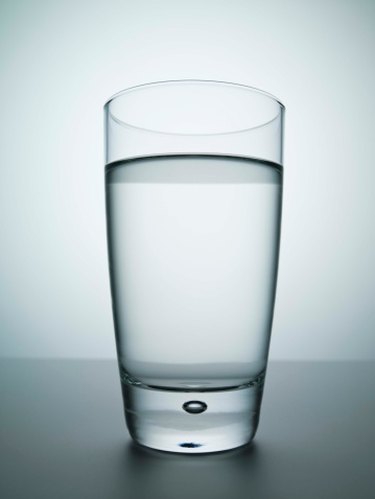
A lipid panel is ultimately a cholesterol test. It's used to determine the level of not just total cholesterol, but also low-density lipoprotein (LDL), high-density lipoprotein (HDL) and triglycerides in your bloodstream. Often referred to as a lipid profile, this blood test is really the first line of defense against high cholesterol. If a reading comes back borderline to high, you and your doctor can take certain measures to bring your levels down into a healthy range. But you can't just go into your clinic and have a lipid panel run; you first need to prepare for the test. One of the requirements is a short period of fasting.
Food
Video of the Day
The first requirement for a fasting cholesterol test is to stop eating foods for anywhere between nine to 12 hours before the panel. This even includes broths, bouillons, soups and gelatins that may be allowed with other types of blood tests. Consider asking for an early-morning appointment so the fasting period can largely take place while you're asleep. And though food may not actually affect the levels of total cholesterol and HDL cholesterol, according to the Harvard Medical Center, it can cause your triglyceride levels to rise upward of 30 percent, which inevitably gives you an incorrect reading.
Video of the Day
Liquids
Along with the restriction of food, you'll also be asked to only drink water within this same nine to 12 hours. That means you'll need to skip your morning coffee or tea as well as any other beverages, such as milk, soda and juice. The reason for this falls largely within the food restriction, since certain beverages may affect your triglyceride levels.
Alcohol
It's also important to avoid alcoholic beverages before a lipid panel. But this guideline doesn't ask that you steer clear of alcohol for just nine to 12 hours; you shouldn't drink any sort of wine, beer or spirits for at least 24 hours before your blood test. And much like with food and other liquids, alcohol can raise your triglyceride levels, according to the Harvard Medical Center, which may also affect your LDL reading.
Medications
Other potential substances that could affect a standard cholesterol test ire prescription and nonprescription medications as well as even supplements. Prior to scheduling your lipid profile, discuss whether or not any medication or supplement that you're currently taking could interfere with your cholesterol levels. If so, most doctors will recommend that you stop taking the drug, vitamin or herb for a number of days before the test, according to the Mayo Clinic. Each medication is different, so there isn't necessarily a standard time frame.